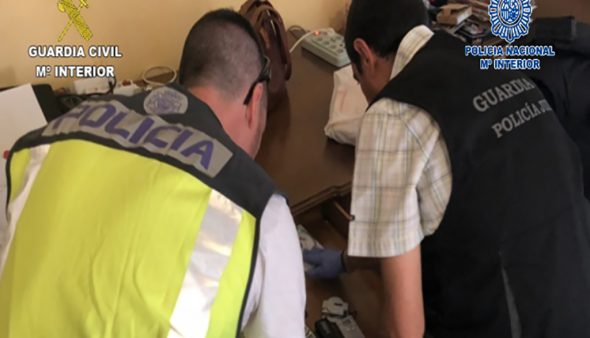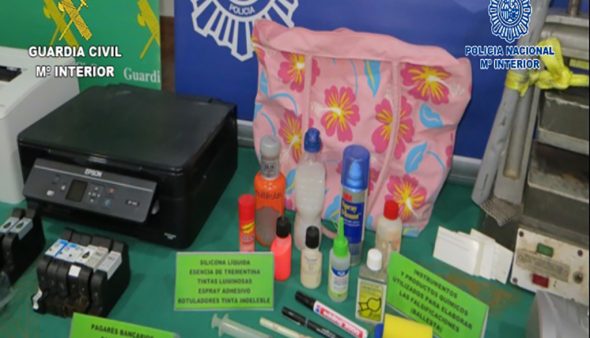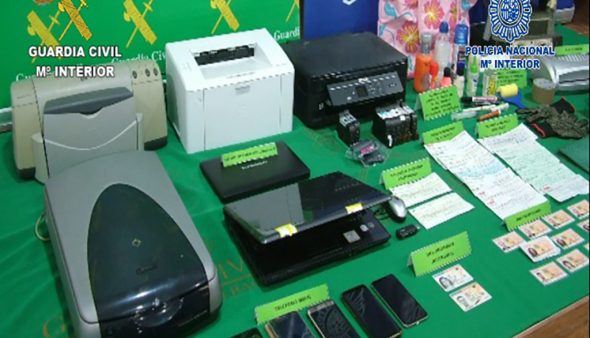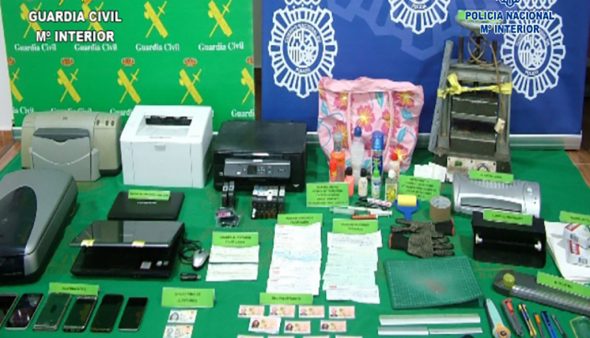The Civil Guard and the National Police, within the framework of the BRAIN-CECI operation carried out in Castilla La Mancha, Madrid, and the Valencian Community, have dismantled an active organization specialized in the theft, forgery and subsequent collection of promissory notes and fake checks.
33 people have been arrested and other 3 have been investigated, aged between 23 and 55 years, for the alleged crimes of fraud, forgery of official and commercial documents, usurpation of marital status, robberies with force and discovery and revelation of secrets It is estimated that the profit achieved by the network could amount to more than 760.000 euros.
They are credited with the commission 1.640 criminal offenses, committed during the years 2017 and 2018 in the provinces of Albacete, Madrid, Valencia, Alicante, Castellón, Murcia, Toledo, Ciudad Real, Guadalajara, Cuenca, Almeria, Malaga, Seville, Jaén, Granada , Córdoba, Cádiz, Burgos, Soria, Palencia, Segovia, Salamanca, Valladolid, Zaragoza, Huesca, Teruel, Santander, Asturias, A Coruña, Lugo, Badajoz, Barcelona and Vizcaya.
Only in the province of Alicante have a total of 26 scams been committed, from the 01 / 03 / 2017 to the 21 / 06 / 2018, amounting to a total of 68.911,35 euros scammed and affecting the towns of Dénia, Orihuela, Sax, San Vicente del Raspeig, Alicante, Rojales, Torrevieja, Ibi, Jijona, Elda, Altea, Elche and Villena.
The operation began as a result of the commission of a crime of fraud at a bank branch in the town of Albacete Pozohondo. After the investigations carried out by the agents, several people were detected who could form an important and complex criminal network dedicated to the theft, forgery and subsequent collection of promissory notes and false checks.
Perfectly organized and hierarchical organization
It was a perfectly organized and hierarchical group. Three of its members would exercise management and coordination functions, located at the top of the pyramid. Then there would be the "forgers", with extensive training and specialization in the manipulation, adulteration and falsification of identification documents and bank payment methods.
In lower levels of the organization were the “mailboxers” or in charge of subtracting the correspondence of the mailboxes of mercantile societies, almost always in industrial estates or directly from vehicles of the Post Office, in search of promissory notes or original checks, which were delivered to the "Chief-counterfeiters", who modified the amount, expiration date and beneficiary information.
On the other hand, other members of the network, the "drivers", were in charge of recruiting and transporting the bank branches chosen to perpetrate the scams to the "pins", who were the material authors of the collections. The latter were provided with false identity documents with their photograph and a signature that they were able to reproduce.
To give veracity to the false documents, the basic information was respected such as the commercial company that issues the document, its bank account IBAN number, the signature of the representative that appears in the original document and the serial number of the document, obtaining this It forms a greater sense of validity.
The falsifications were carried out in the "laboratories", attesting to the existence of at least three buildings dedicated to these needs, whose location was only known by the "Chiefs" of the organization. In them, during the records carried out, computers, printers and scanners of maximum technological features were located, as well as the stolen postal correspondence, documents already forged and ready for use, chemical products, luminescent inks and buffers prepared to simulate security measures of commercial or identity documents, as well as quality paper identical to that used for the legal issuance of financial effects.
Records and effects intervened
During the exploitation phase, 4 records were carried out in the residences of the chiefs and in a flat used as a laboratory, where the tasks of falsifying identity documents and bank payment methods were performed.
In these records, a large number of effects or objects related to the investigation were seized, among which were:
- 3.220 euros, in bills of different value, from the criminal activity investigated.
- Numerous mobile phones.
- Complete computer equipment (computers, printers and scanner).
- Chemical products, luminescent inks and an ultraviolet light device.
- Quality paper identical to that used legally for the issuance of financial effects.
- Plastic presses plasticizers and guillotines to cut the paper.
- Various tools such as cutters, scissors, rollers, syringes, glues, indelible markers, gloves, etc ...
- Numerous identity documents (DNI's) and financial means of payment (promissory notes / checks) and other originals stolen.
The operation has been carried out jointly by members of the Organic Judicial Police Unit of the Civil Guard Command of Albacete and the Drugs and Organized Crime Unit (UDYCO - Group IX - Counterfeit and Scams) of the Provincial Police Brigade Judicial of the National Police Corps of Madrid.
The proceedings with the detainees were made available to the Court of Instruction No. 2 of Albacete.










